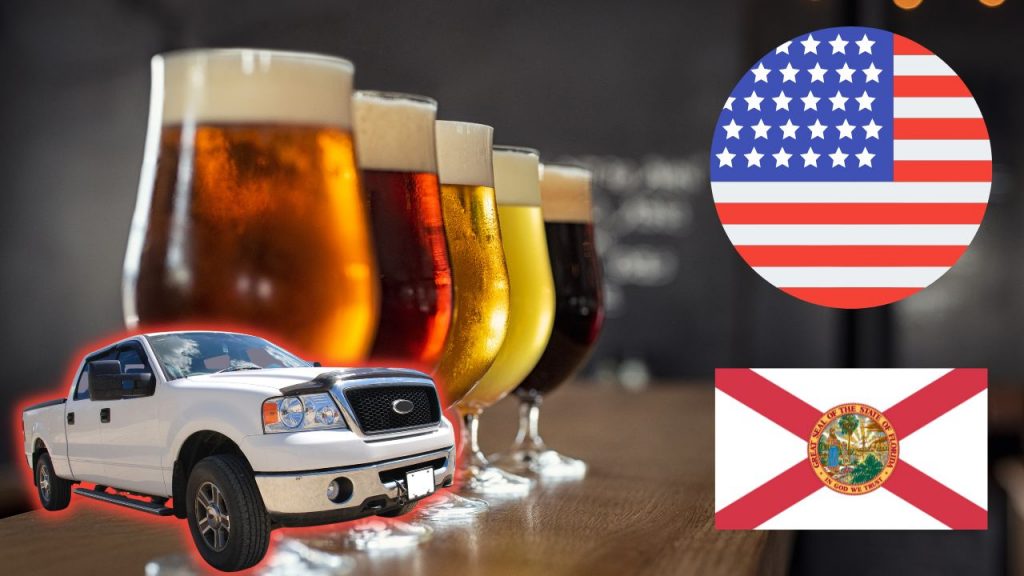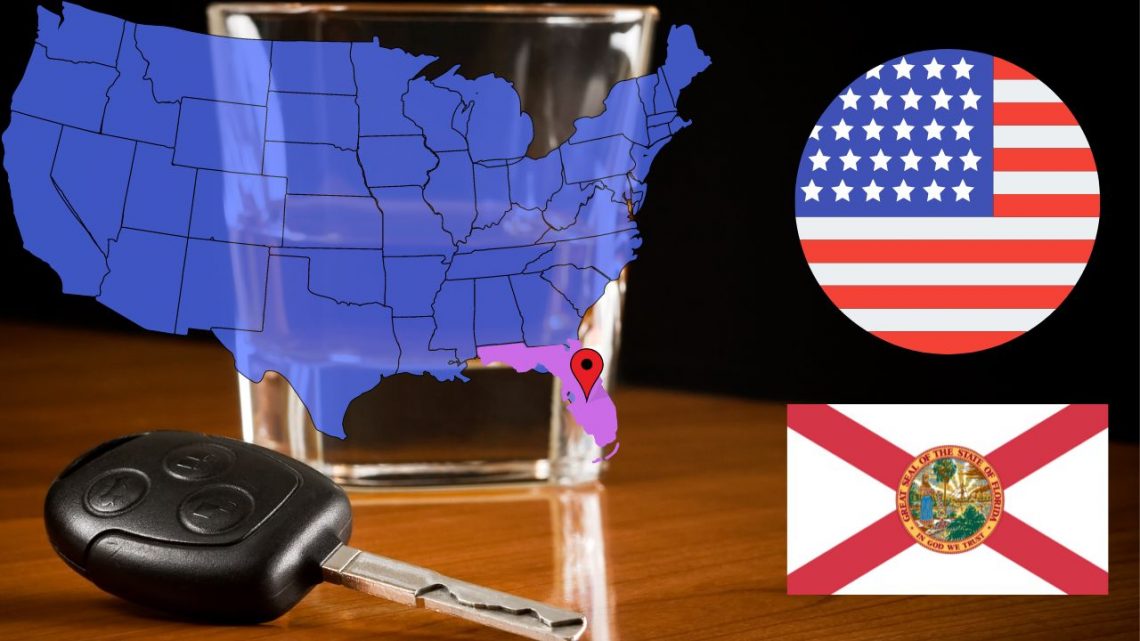In Florida, the maximum legally permissible blood alcohol content (BAC) is set at 0.08%, which equates to 80 milligrams of alcohol in every 100 milliliters of blood.
It is essential to understand that this article aims to inform readers about Florida’s DUI laws. This page does not seek to encourage drunk driving in any state or locality.
What is the Legal Alcohol Limit for Driving in Florida?
In Florida, the legal alcohol limit for driving varies based on the type of driver’s license and the driver’s age. It’s crucial for all drivers to be aware of these limits to ensure safety and compliance with state laws. Here’s a breakdown of the legal Blood Alcohol Content (BAC) limits for different categories of drivers:
- Regular Drivers: The legal BAC limit is 0.08%. This applies to most drivers operating personal vehicles.
- Commercial Drivers: For those holding a commercial driver’s license, the legal BAC limit is lower at 0.04%, reflecting the higher standards for professional drivers.
- Minors (Under 21): Florida enforces a strict policy for underage drivers. If you are under 21, it is illegal to drive with any detectable amount of alcohol in your system. This zero-tolerance approach aims to discourage drinking and driving among young drivers.
Drink and Drive Penalties and Punishments in Florida
Under Florida law, driving under the influence (DUI) of alcohol, chemicals, or controlled substances is a serious offense. Conviction penalties are significant and are applied uniformly, regardless of whether impairment is proven by faculties or by exceeding the legal blood alcohol level (BAL) of 0.08% or higher.
DUI Fine Schedule (per section 316.193, Florida Statutes)
- First Conviction:
- Standard fine: $500 – $1,000.
- With BAL ≥ 0.15, or a minor in the vehicle: $1,000 – $2,000.
- Second Conviction:
- Standard fine: $1,000 – $2,000.
- With BAL ≥ 0.15, or a minor in the vehicle: $2,000 – $4,000.
- Third Conviction (within 10 years of second):
- Standard fine: $2,000 – $5,000.
- With BAL ≥ 0.15, or a minor in the vehicle: Minimum $4,000.
- Third Conviction (more than 10 years after second):
- Same as above.
- Fourth or Subsequent Conviction:
- Standard fine: Minimum $2,000.
- With BAL ≥ 0.15, or a minor in the vehicle: Minimum $4,000.
Additional Penalties
Additional penalties may be imposed by the court. For specifics, please see section 316.193, Florida Statutes.
Imprisonment
Sentencing may include imprisonment or treatment programs, credited toward imprisonment.
- First Conviction:
- Up to six months.
- With BAL ≥ 0.15, or a minor in the vehicle: Up to nine months.
- Second Conviction:
- Up to nine months.
- With BAL ≥ 0.15, or a minor: Up to 12 months.
- Within five years of prior: Minimum 10 days (48 hours consecutive).
- Third Conviction:
- Within 10 years of prior: Minimum 30 days (48 hours consecutive).
- More than 10 years after prior: Up to 12 months.
- Fourth or Subsequent Conviction:
- Up to five years, or as per section 775.084 for habitual/violent offenders.
Vehicle Impoundment or Immobilization
- First Conviction: 10 days.
- Second Conviction (within five years): 30 days.
- Third Conviction (within 10 years): 90 days.
Impoundment or immobilization should not overlap with incarceration. The court may waive impoundment for vehicles used solely by the defendant’s employees or business.
Note: Laws and penalties can change. It’s important to frequently check the official state website for the most up-to-date information.
How Can I Calculate if My Alcohol Blood Limit is Legal in Florida?
In Florida, the legal alcohol limit for driving is strictly enforced. Police determine a driver’s blood alcohol content (BAC) through breathalyzer tests at traffic stops or blood tests in more formal settings. Understanding your BAC level is crucial to ensuring you’re driving legally and safely.
Recommended Ways to Check Your BAC Level
As an experienced phlebotomist with a decade of professional background, I recommend two methods for individuals to estimate their BAC levels, helping to prevent the risks associated with drunk driving:
- Use a High-Quality Alcohol Breathalyzer: One of the most reliable breathalyzers on the market is the BACtrack S80. Known for its professional-grade accuracy, this device is DOT & NHTSA approved and FDA 510(k) cleared. I strongly recommend keeping one in your vehicle, especially in Florida, where individuals may underestimate their impairment. The BACtrack S80 can offer a reliable estimate, aiding in responsible decision-making.
- Utilize a BAC Calculator: Together with fellow phlebotomists and web developers, I have developed an online BAC calculator. This tool can provide an estimated BAC level based on the input of various factors such as the amount of alcohol consumed, the time frame of consumption, weight, and gender. It’s designed to be user-friendly and informative.
Important Consideration
While both the BACtrack S80 breathalyzer and the online BAC calculator can provide valuable estimates of your alcohol level, it’s crucial to remember that these methods are not 100% accurate. Factors such as metabolism, food intake, and individual health conditions can affect BAC levels. Therefore, these tools should be used as guidelines to assist in making safer choices rather than definitive measures of legal impairment.
If you’re planning to drink, the safest bet is not to drive. Using these tools can help you understand your BAC level and potentially deter you from driving if you’re close to or above Florida’s legal limit of 0.08%. Always prioritize safety and legality to avoid the severe consequences of DUI charges.
Ways to Avoid Driving with a High BAC in Florida

Driving under the influence of alcohol poses significant risks to yourself and others on the road. In Florida, where the legal blood alcohol content (BAC) limits are strictly enforced, it’s essential to plan ahead if you intend to consume alcohol. Here are some practical suggestions to ensure you get home safely without risking a DUI charge:
Utilize Ride-Sharing Apps or Local Taxi Services
One of the simplest and most effective ways to avoid driving after drinking is to use ride-sharing apps like Uber or Lyft. These services provide a convenient and safe way to get home at any hour. Additionally, you can rely on local taxi companies, which are readily available in most Florida cities. For instance, in Jacksonville, you can contact ABC Taxi LLC, or if you’re in Miami, TAXI MIAMI HOTELS AREA CAB offers reliable services. These options ensure you have a safe ride home without the need to drive yourself.
Order a Designated Driver Service
If you find yourself in a situation where you’ve driven to a location and consumed alcohol, leaving your car behind might not feel like an option. Fortunately, designated driver services are available to assist. These services can provide a driver to take you and your car home safely. In Jacksonville, Found-A-Ride is a notable option, while Designated Elite Drivers offers similar services in Miami. To find a designated driver service in your area, a quick online search for “designated driver service” followed by your city name should provide relevant options.
Key Recommendations:
- Plan Ahead: Before heading out, decide on how you’ll return home. If you plan to drink, leave your car at home and opt for public transportation, a taxi, or a ride-sharing app.
- Use Designated Driver Services: If you’ve already driven, consider hiring a designated driver to ensure both you and your car return home safely.
- Stay Informed: Keep a list of local taxi services and designated driver companies in your phone. Knowing your options in advance can make it easier to avoid making a risky decision after drinking.
Remember, the goal is to enjoy your time out without compromising your safety or the safety of others on the road. By choosing not to drive after drinking, you’re making a responsible and commendable decision.
Obeying Impaired Driving Laws in Florida: Sad Statistics
In 2020, Florida saw a decrease in impaired driving fatalities, with 746 cases reported, showing a decline from 2019. Despite this, the Florida government continues to emphasize the importance of DUI awareness.
Understanding Florida’s legal BAC level before driving is crucial. Opt for a designated driver, taxi, or ride-sharing service like Uber if you’ve been drinking.
To stay informed on DUI regulations, visit Florida’s official website. It’s vital to recognize the dangers of drunk driving and the unpredictability of your BAC level after consuming alcohol.
Since alcohol affects individuals differently, the best way to know your BAC is through a certified alcohol breathalyzer. Numerous transportation options exist for those intoxicated—consider a friend, taxi, or Uber.
Ensure you’re within the legal BAC limit if driving is unavoidable and familiarize yourself with Florida’s DUI laws for safety.







